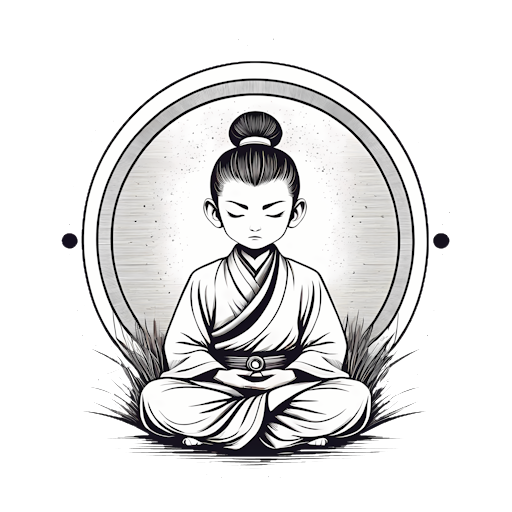Zen Buddhism, often simply referred to as Zen, is a spiritual path that leads practitioners on a journey of self-discovery, inner peace, and enlightenment. Rooted in the rich traditions of Buddhism, Zen offers a unique approach to understanding the nature of existence and the human mind. In this beginner’s guide, we will explore the history of Zen Buddhism, delve into the practice of Zen meditation for beginners, and uncover the fundamental principles of Zen philosophy.

History of Zen Buddhism
Zen Buddhism has a long and storied history that dates back to ancient India and the teachings of Siddhartha Gautama, the Buddha. However, its distinctive form and character began to take shape in China during the 6th century CE. One of the central figures in the development of Zen was Bodhidharma, a legendary monk who is often considered its founding patriarch.
Bodhidharma’s journey from India to China marked a pivotal moment in the evolution of Zen. His teachings focused on direct insight and personal experience as the means to attain enlightenment. He is famously attributed with the statement, “A special transmission outside the scriptures, not founded upon words or letters; by pointing directly to the human mind, it lets you see into your own true nature and thus attain Buddhahood.”
Zen’s transmission of wisdom from master to student, often referred to as the “Dharma transmission,” became a defining feature of Zen practice. Zen teachings were imparted through personal, non-verbal communication, often in the form of enigmatic koans (paradoxical questions or statements) or through the silent language of meditation.
Zen found its way to Japan during the 12th century, where it further evolved and became deeply ingrained in Japanese culture. The Japanese word “Zen” is derived from the Chinese word “Chán,” itself influenced by the Sanskrit term “Dhyāna,” which means meditation. Zen’s essence is in the practice of meditation and the direct experience of reality beyond concepts and words.
Zen Meditation for Beginners

Zen meditation, known as “zazen,” is at the heart of Zen Buddhism. It is a simple yet profound practice that offers a gateway to inner peace and self-realization. For beginners, getting started with zazen can be both challenging and rewarding.
Setting the Stage
To begin your journey into Zen meditation, find a quiet and comfortable space where you won’t be easily distracted. A cushion or a comfortable chair is useful to maintain a proper posture. The lotus or half-lotus position is commonly used, but you can also sit cross-legged with your spine straight.
Focusing on the Breath
Once you are settled, focus your attention on your breath. Breathe naturally, without attempting to control or manipulate your breath. Inhale and exhale with awareness, feeling the sensation of the breath as it enters and leaves your body. This process is a simple yet powerful way to anchor your mind to the present moment.
Letting Go of Thoughts
As you meditate, you will likely find your mind wandering and various thoughts surfacing. Zen meditation encourages you to observe these thoughts without judgment and then let them go. Gently return your focus to your breath. It’s perfectly normal to have a busy mind; the practice is in recognizing this and returning to the breath.
Embracing Silence
Zazen is about embracing silence and stillness. It’s not about seeking to achieve anything or attain a specific state of mind. The act of sitting in silence itself is the practice. Over time, you may experience moments of profound insight and peace, but do not rush the process.
Consistency is Key
Consistency is vital in Zen meditation. Try to establish a daily practice, even if it’s just for a few minutes. With time, you’ll find that your meditation deepens, and its benefits become more apparent in your daily life.

Zen Philosophy Basics
At the heart of Zen Buddhism is a profound philosophy that seeks to transcend dualistic thinking and lead to a direct experience of reality. Here are some fundamental principles that will help you grasp the essence of Zen philosophy.
Non-Duality
Zen teaches the concept of non-duality, which means the dissolution of distinctions between self and other, subject and object, and ultimately, all dualities. In Zen, the separation of self from the external world is an illusion. Through meditation and mindfulness, one can directly experience the interconnectedness of all things.
Emptiness
The concept of “emptiness,” often referred to as “sunyata” in Buddhism, is central to Zen philosophy. It does not mean nothingness but rather the idea that everything is interdependent and lacks inherent, fixed existence. Emptiness is a powerful reminder to let go of attachments and rigid conceptualizations, allowing for a more fluid and open perspective on life.
Direct Experience
Zen emphasizes direct experience over intellectual understanding. It encourages individuals to go beyond words and concepts to grasp reality as it is. This direct experience is often sought through meditation, where one can bypass the limitations of language and thought to touch the essence of existence.
The Role of Koans
Koans are enigmatic riddles or paradoxical statements used in Zen to break the linear, conceptual thinking that binds the mind. They are not meant to have rational solutions but instead serve as tools for meditation. By contemplating koans, practitioners can transcend ordinary thought patterns and access deeper layers of insight.

The Teacher-Student Relationship
Zen places great importance on the relationship between teacher and student. The teacher, often referred to as the “roshi,” guides the student on their journey of self-discovery. This direct, personal transmission of wisdom is a unique feature of Zen and helps the student navigate the complexities of the path.
Everyday Zen
Zen is not confined to the meditation cushion or the monastery. It encourages the integration of its principles into everyday life. Practicing mindfulness and presence in daily activities, from eating to walking, can help individuals experience the profound wisdom of Zen in their ordinary lives.
Conclusion
Zen Buddhism for beginners can be a transformative journey, offering a path to self-discovery, inner peace, and a deeper understanding of the nature of reality. While the practice of Zen meditation and the study of Zen philosophy can be challenging, the rewards are profound. Through a direct experience of reality and the dissolution of dualities, one can come to realize their true nature and, ultimately, find enlightenment. Zen is a path that transcends words and concepts, making it a practice of profound simplicity and depth, accessible to all who embark on the journey. As you delve deeper into Zen, you will discover that it is
Useful External Links:
- Zen Buddhism on Wikipedia
- Introduction to Zen Meditation (Zazen) – Zen Mountain Monastery
- Zen Centers and Meditation Groups Worldwide – Find a local Zen centre or group to join your meditation practice.
- Koan Study and Resources – A guide to understanding and practicing with koans in Zen.
Soto or Rinzai? I have practiced Soto on and off all my life. Never really have explored Rinzai. At almost 72, I’d like to settle. Honestly, the Abrahamic religions still appeal to me, in particular Islam because of it’s strong ethics and morals, but all those religions have some serious cognitive dissonance problems I am no longer willing to accept and that’s what you have to do to be part of them. Buddhism, as far as I know, tells us to question everything, even Buddhism. I can hang with that. Let me know. Suggestions?